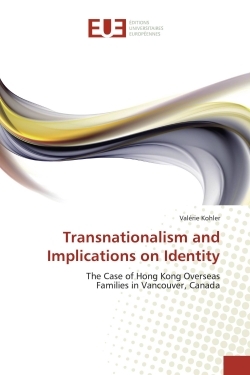- EAN13
- 9786131533785
- Éditeur
- Univ Européenne
- Date de publication
- 10 septembre 2010
- Collection
- OMN.UNIV.EUROP.
- Nombre de pages
- 156
- Dimensions
- 22 x 15 x 0,9 cm
- Poids
- 239 g
- Langue
- eng
Transnationalism And Implications On Identity, The Case Of Hong Kong Overseas Families In Vancouver, Canada
Valérie Kohler
Univ Européenne
Prix public : 49,00 €
In this book, the author focuses on transnationalism through trans-Pacific migratory processes and its implications on the evolution of identity in Hong Kong families in Vancouver, Canada. Under the system of reference of social and cultural geography, three main parts are discussed: a conceptual one presenting surrounding aspects of transnationalism and its underlying concepts of identity, perception and sociocultural capital. The second part is empirical with a qualitative survey based on a case study, represented by the second generation of Hong Kong migrants of the 1980s-1990s. Several adaptative strategies such as cultural logics, social networks and cumulative forms of capitals, are also analysed as tools for hybrid identity construction, with dimensions of cosmopolitanism. In the final part, further questions are raised as to how transnationalism may influence these generations at a broader level and how national identities are located in individuals in light of a growing tendency towards universalism.


















